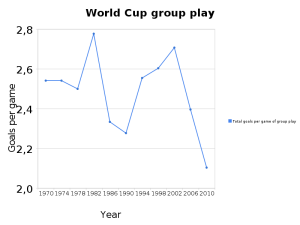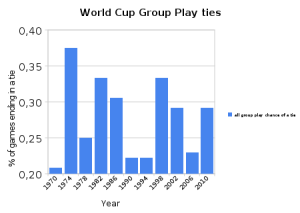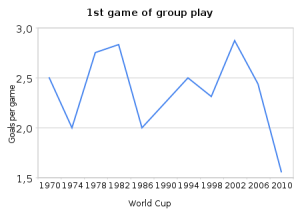Back to the question I asked after the first 1/3 of group play: is this a boring World Cup so far? Well, it is a low scoring World Cup, whether you call that boring is your opinion.
Through group play, 2010 is indisputably the lowest scoring World Cup in history.
After the first set of games in group play, there were only 1.56 goals per game, so scoring has gone up significantly since then. Some of that was helped by Portugal scoring so many times against North Korea (7-0), but almost every World Cup has at least one really one-sided blowout.
However, the number of ties per group play is fairly close to the mean.
By the way, although I titled the post provocatively for google, I do not think this has been a boring World Cup. While it is low-scoring, it hasn’t been boring in the slightest bit from my view. And my teams have done pretty well so far.
Why are there no goals?
I’m sticking with my reasons before: parity, variance, and — at least a little bit — the ball.
Parity: teams are just more equal.* With the exception of North Korea, teams were relatively equal. Italy might have had the easiest group and yet it still failed to advance. There weren’t really any teams who allowed 4-0 victories as there may have been in past World Cups. As noted in the previous post, the World Cup expanded in 1998 and 1982, which seems to correlate with more goals.
Variance: Tighter offsides calls, whatever. Sometimes teams just score less and there is no explanation.
The ball: while plenty of domestic leagues used the ball in the last year, it does seem to be flying differently in the high altitude of South Africa if you believe the players. Not sure if only this ball flies differently, or if the altitude is really the big factor here, but I’m inclined to believe that this is in fact an issue that is affecting play. I have no idea whether teams will become accustomed to the ball in further stages or not and thus increase scoring.
* I’d note that you could argue this the other way. You could say that teams falsely appear more equal because there is less scoring.





 Posted by evan
Posted by evan 